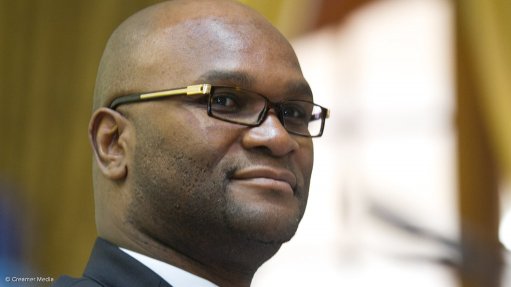
Nathi Mthethwa
Photo by: Duane Daws
June 18, 2015.
For Creamer Media in Johannesburg, I’m Sane Dhlamini.
Making headlines:
The Public sector wage settlement is likely to be resolved by Friday.
The United Nations says the world's displaced hits a record high of 60-million people.
And, the electricity war room sees the recovery in coal-fleet performance as the ‘number one priority’.
A meeting on Friday between public sector union negotiators and Acting Public Services Minister Nathi Mthethwa may finally resolve the pay and conditions impasse in the public sector.
A number of suggestions are understood to have been tabled by the unions, who are still insisting that an agreed 7% pay rise be paid.
Government unilaterally reduced this increase to 6.4%, claiming that public sector workers had been overpaid by 0.6% in the last year of the previous multi-term deal.
The unions maintained that it was not only unjust, but illegal to deduct money because of an error made in a previous agreement.
However, there are signs that much of the anger expressed earlier by public sector workers had subsided with a union negotiator admitting that many members didn’t think it was worthwhile to go on strike for 0.6%.
In the meantime Cosatu unions, being allied to the government, have been put on the spot and Cosatu president S’dumo Dlamini has blamed unnamed officials for reducing the agreed pay rise.
Almost 60-million people worldwide were forcibly uprooted by conflict and persecution at the end of last year. This is the highest ever recorded number, the UN refugee agency said on Thursday.
More than half the displaced from crises including Syria, Afghanistan and Somalia were children, the United Nations High Commissioner for Refugees (or UNHCR) said in its annual Global Trends Report.
The aid agency said in 2014, an average of 42 500 people became refugees, asylum seekers, or internally displaced every day, representing a four-fold increase in just four years.
UNHCR said Syria, where conflict has raged since 2011, was the world's biggest source of internally displaced people and refugees.
South Africa’s electricity war room, which was set up in December to deal with the country’s power crisis, views the recovery in the performance of Eskom’s coal power stations as its “number-one priority”.
This was with the deterioration in the fleet’s energy availability factor (or EAF) determined to be largely to blame for the utility’s inability to match demand with supply.
In parallel, though, it was also seeking improved coordination and demanding greater urgency on the implementation of both demand-response measures and cogeneration procurement, which are perceived to be two important short-term stabilisation levers.
The war room’s Malcolm Simpson argued that, by delivering on these three urgent elements of Cabinet’s larger five-point plan, the country should be in a position to close, over the coming year, the prevailing 3 000 megawatt gap that was making the network vulnerable to ongoing rotational load-shedding.
Also making headlines:
Deputy President Cyril Ramaphosa insists government cost cutting is working while a ministerial handbook is being finalised.
Roads and Transport MEC Ismail Vadi says Gauteng residents need to change their mindsets on e-tolling.
And, a Boko Haram bomb kills 13 people and injures 45 in northern Nigeria.
Don’t forget to follow us on Twitter [@PolityZA]
That’s a roundup of news making headlines today.